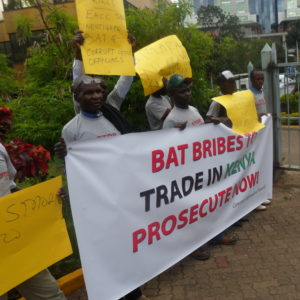In the United States, thanks to the powerful organizing of Corporate Accountability and its allies, the deadly deception and corruption of Big Tobacco can sometimes seem like a painful memory of the past. And, to some extent, it’s true. Our organizing helped create the public climate necessary for strong U.S. public health policy and the global treaty that followed, which have reined in Big Tobacco and protected people around the globe. But despite these protections, recent revelations show the tobacco industry is still up to its same old tricks.
In February, ten Members of Congress, called on the U.S. Department of Justice to investigate British American Tobacco (BAT) for an unprecedented conspiracy of bribery. The call comes after exposés by the BBC, the Independent, and Al Jazeera uncovered the nature and extent of BAT’s bribery to advance its business interests and block public health policy across eastern Africa.
The wholesale corruption was revealed late last year by a whistleblower named Paul Hopkins, a self-described “commercial hitman.” During his 13-year tenure working for the corporation, he violated law after law at BAT’s behest.
According to Hopkins, BAT bribed policymakers to subvert or block health policy in Rwanda, Kenya, Uganda, Burundi, and Comoros. Incredibly, some of these bribes were even authorized and sanctioned by a regional BAT executive. And, as if that weren’t bad enough, evidence suggests BAT illegally spied on competitors and public officials.
It’s highly likely that these revelations will prompt investigations in the U.K. and Kenya, if not in all the countries implicated in this scandal.
BAT is a global tobacco powerhouse but is heavily invested in the United States, too. The corporation owns 42 percent of Reynolds American, Inc. (RAI), the producer of Camels and Newport. RAI also distributes BAT’s flagship brands like Lucky Strikes here in the U.S.
BAT is also the former owner of Brown & Williamson, the very tobacco corporation whose own whistleblower’s testimony played a critical role in a cascade of lawsuits in the U.S. and paved the way for the Master Settlement Agreement in 1998. The lawsuits and agreement resulted in a slew of tobacco control policies here in the U.S., which has driven smoking rates to historic lows, saved countless lives, and prompted a tectonic shift in public opinion against the industry.
Surprising or not, what Paul Hopkin’s account alleges are serious violations of law—not only in the countries in question, but also under U.S. law. The Foreign Corrupt Practices Act (FCPA) specifically addresses bribery of public officials abroad and has been used to hold other transnational corporations like Wal-Mart accountable for similar abuses.
Globally, the tobacco industry is responsible for more than 6 million deaths every year and tobacco-related disease remains the leading preventable cause of death in the United States. We may have made progress in the U.S. but with so many lives on the line, there is still much work to be done. The Department of Justice must use every tool at its disposal—including FCPA—to help curb this epidemic around the globe.
It’s not simply a legal obligation, it’s a moral imperative.
In many places in the Global North, we’ve enjoyed some of the strongest public health protections but that can’t be where it ends. We must protect all people from the abuses of this deadly industry and our elected officials must be leaders on this. We must not let Big Tobacco operate with impunity anywhere, here at home or abroad.
As we enter yet another election year, there is no single issue more socially, morally—and yes, politically—constructive. Our leaders must demand the Department of Justice carry out this investigation and help end the tobacco epidemic for good.



